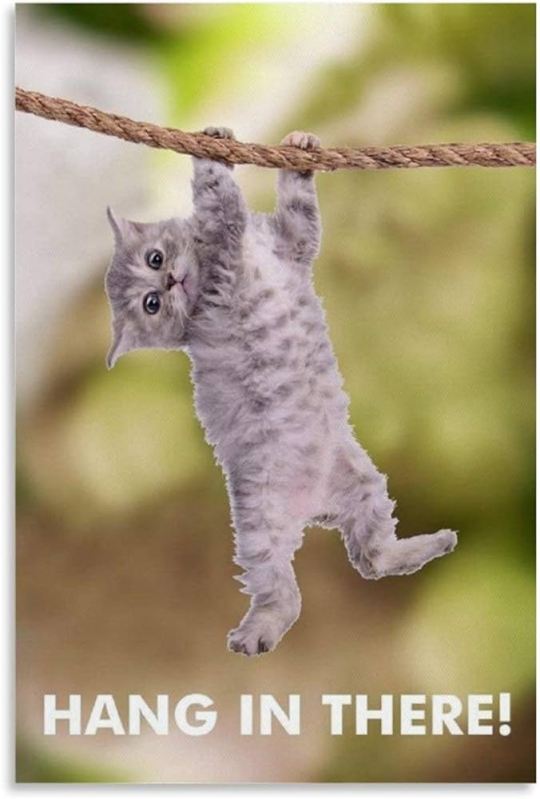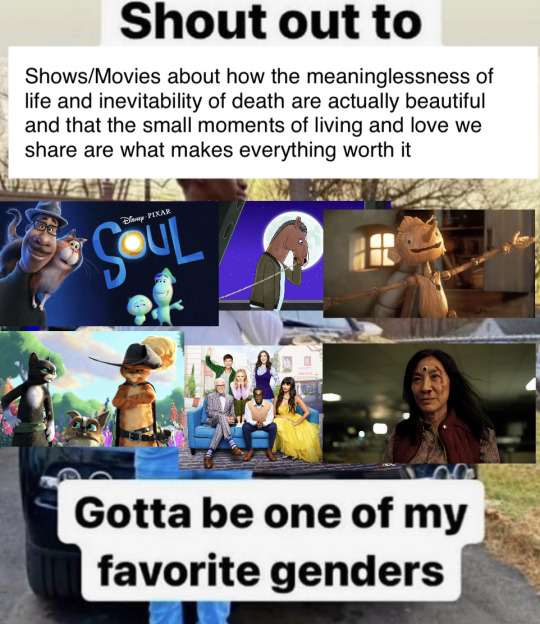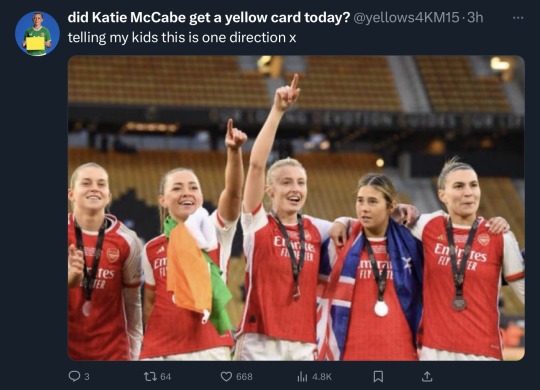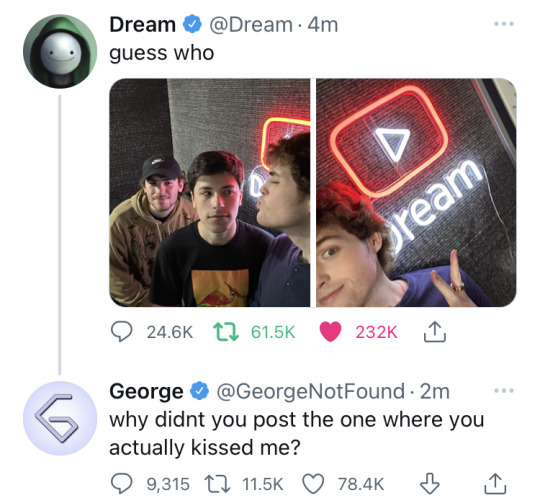Text
I fear not even she can save this awful kit but her forearms, jawline and face card are doing the best job they can

178 notes
·
View notes
Text

I might be wrong but Alexia seems to want the ball

This one cracked me up
247 notes
·
View notes
Text
tell a friend to tell a friend she’s baaacckkk 👑



155 notes
·
View notes
Text
Job Application Advice from Someone Who Works in a Career Advising Office
[As per requests by @akariaikawa, @machinegunbukkake, and an anon ask]
Mostly irrelevant disclaimer: I am so sleep deprived and I feel like my brain has been straight up microwaved so this will be at least slightly unhinged so apologies up front for that. Grad school finals are no joke and I do NOT recommend getting a PhD in anything unless you really really want to. This shit is not for casuals. So I hope that you manage to get something out of this guide that got put together by the soup-for-brains version of me who uses way too many exclamation points and makes asides like I’m a Shakespearean actor.
Anyway, let’s get this fucking show on the road, it’s gonna be a long one.
Actually relevant disclaimer: I’m American and the career office I work in is at a university, so a lot of this advice is going to be America/College/Entry Level-centric, BUT not all of it! At least a good half is going to be applicable to job applications in general, so feel free to skim through those other parts. ILY.
(also for those of you who are non-americans, in the US college=university. They’re the same thing so I’m gonna use the terms interchangeably just fyi)
(also also I am, as mentioned, a grad student so I have like negative money. I am incapable of blazing this post but if anyone else is feeling generous enough to, please be my guest and I will kiss you directly on the mouth or like give you a firm handshake, whichever you prefer)
STRUCTURE/TABLE OF CONTENTS
Resumes/Cover Letters
Indeed Should Only Be Your Side Piece
Interviews (barf)
Misc. Advice/Resources to Look Into
Don’t Give Up! I Believe in You.
RESUMES/COVER LETTERS
Hello, you are doing your resume wrong and it’s going directly in the trash. I am not kidding. My boss (at MY career office) literally ripped mine to pieces before she agreed to send it to the hiring people when I first applied, so unless you have taken a class or talked to an advisor person about it, I guarantee your resume is working against you instead of for you. So let’s fix that.
First: Your resume should ONLY be one page. Yes one. No not even double-sided. One. Page. Your professional references are their own separate document, don’t include them on your resume. You are absolutely allowed to fuck with the margins of your resume to squeeze in whatever you need to and go small on the font, but don’t go any lower than size 10. Here are some examples of a resume and here are more. The basic structure of a resume is the same no matter the position and oftentimes a company, especially a larger one, will put your resume through an algorithm before it ever sees human eyes and that algorithm will do its algorithm math (insert bad joke about girl math) on the structure and content of your resume and decide on whether to trash it or approve it for initial evaluation for hr. The biggest hurdle is not being under-qualified or undereducated, it's beating the algorithm. Go figure. (Also don't worry about what section to put where or whether or not you used the right font, that level of detail is not necessary. Just keep things black and white and classy, I'll include a list of things you should include in your resume and what you don't need to include at all at the end of this section.)
Second: DESCRIBE your professional experience, don't just list it. Don’t have any professional experience? Yes you do. Have you volunteered anywhere? That’s professional experience. Unpaid internship? Professional experience. Babysat your neighbor’s kids? Professional fucking experience. It’s not about the position as much as it is about how you sell it. Include as many numbers as you can in your description, those HR bitches fucking love numbers. Anything to do with leadership? Emphasize that! Train anybody on anything? Note that shit and how many too (bitches love numbers). In the midst of the hell of covid before I decided to go back to school because I just couldn't fucking take it anymore I worked at target. In fact, I worked at two different targets, one a year after the other and god the second one was so much worse than the first. But! They provide a good example for how to frame job experience on your resume. So take a gander:

See what I did? Looks super professional and impressive, right? The people reading it would have no idea that I spent months daydreaming about killing my boss (fuck you Allison you made my life a living hell) or that these were both entry-level, minimum wage positions. It's all about the phrasing.
Which brings us to the third point: personalize that shit. You want to beat the algorithm so use its basic function against it. Your description of your job experience should include as many action words as grammatically possible. Where should you get most of those action words? The job description that the algorithm is referencing! Does that shit talk about teamwork? Use it in a description. Does it mention wanting an “independent, hard worker?” Describe what you did independently as you worked really hard at your job. And put numbers in there!! (Bitches love numbers)
What to include:
Contact info. Put that at the very top and make sure to include your full name and email address. You can also put your phone number if you're comfortable.
Your education. That's usually the first section people go with unless it's taking too much space away from your professional experience section and it's not really relevant, in which case it's OK to exclude it.
Professional experience. This includes paid and unpaid positions, internships, as well as non-contract work (babysitting, etc.) and volunteering. You can separate these into different sections or just list them all chronologically (Most recent goes on top!!)
Dates. Date that shit! Put the start and end date on all of it (bitches love numbers). Don't worry about exact days, month is fine. You can guesstimate on your older stuff.
Relevant skills. Feel like your resume is too empty? Add a skill section. Know how to code but never used that skill in the workplace? Add it in a skill section. Don't have skills? Yes you do. Teamwork, leadership, moderating arguments. Microsoft office. It's all skills. Google examples of resume skills and steal whichever ones fit best.
What you don't need to include:
Your physical address. They don't need to know where you live!
Your GPA. You're not applying to grad school, they don't need to know.
Your previous salary. It's mostly irrelevant and also none of their business.
Your volunteer experience from 6th grade. Work experience in high school is fine if you're under the age of 35, but don't include shit from when you were 11.
BEFORE I FORGET! If you’re applying to a job with the US federal government (not state governments or lower) they have a whole different resume recipe that’s the opposite of concise. This is the federal govt so they want your previous addresses, your salary for allll of your previous jobs, your fucking social security number, and your favorite color. I’m not super familiar with it but here is a guide from the DOL. Good luck and may god have mercy on your soul or whatever.
Cover Letters are the Ernie to your resume’s Bert. (Sesame Street reference!) Your resume is serious and detailed and to the point, your cover letter is you introducing yourself. Hello, my name is [Francine or something] and I am really interested in working with/for you because of reasons 1, 2, and 3 and I think I would be a good fit because I am a team player with these relevant skills (phrasing pulled from job description!) to do the job well and be a reliable employee. I look forward to hearing from you, [signature], printed name. That's it! And yes, it only needs to be one page too. Tailor the letter a bit to the specific employer because it will a) let them know you put in the effort to learn about them and b) make sure they don't think you're sending the same generic, insincere letter to 200 other companies as well. It doesn't have to be super detailed or insanely earnest, you just need to make them believe that you want to work for them specifically because they're special. (Protip: if you can find it, address the letter to the specific name of the person who will be reviewing applications. They love to be acknowledged.) Here are some example cover letters and here is some more advice. Go nuts.
INDEED SHOULD ONLY BE YOUR SIDE PIECE
My dude. My guy. Girlypop. Indeed does not deserve all the effort you are sinking into this relationship. It’s trash - literally, it’s full of spam postings - and you should be spending the majority of your time on other resources. I’m not saying abandon indeed entirely, some people still manage to get jobs through it, but like it and other public job board websites are not your friends. Statistically speaking, it's estimated that 70% of job openings are never actually posted online.
So where the fuck are they???
They are in email lists and internal company memos and water cooler conversations. This is where perhaps the least understood part of the job market comes in: networking. It’s estimated that up to 85% of people got their most recent job through networking. Of the three currencies involved in the job market (education/qualifications and professional experience are the other two) networking is usually the biggest bang for your buck. You're not usually going to get a job if you have literally no experience in the field, but getting your foot in the door to the room where they decide whether you're experienced enough or not most often depends on who you know - who do you know who already has access to the room where it happens. Yes, this is why nepo babies exist and is generally detrimental to the principles of meritocracy, but I'm not here to critique the job market, I'm just here to advise you on how to wrangle the beast. And the reason why networking works is because companies prefer to hire known quantities instead of rolling the dice on strangers.
But imsuuuuupertired, you say, I don't have a network. Yes you do. You have friends and family and coworkers. If you're in college you have professors - go to their office hours and get to know them. Get involved in their research. Previously did an internship? Check in with the internship coordinator or HR.
But imsuuuuupertired, I really don't have a network. I'm an orphan and this is the first day I've ever left the cave I grew up in. Where do I go about forming a network with the least amount of effort necessary?
LinkedIn Baybee - the social media site where cyberstalking someone is encouraged and you should totally do it. It’s like facebook specifically for your professional persona except that Linkedin has not aided and abetted any ethnic genocides (as far as I know). What you do (after setting up your profile and making a couple posts) is go stalking. There is a job posting page but beware! It's the same shit as indeed. (also insider info: all that “# of people have already applied to this position” shit is all lies. Lies!) That's not what LinkedIn is for!!!
LinkedIn job heist plan:
Step 1: find the page of a large community/organization that you are at least tangentially involved in. If you’re in college/just graduated this could be your university’s alumni page. Alternatively, find the page of an employer that you really want to work for.
Step 2: use their search bar to look up people who have your dream job or work in your dream office and single them out. Don't shoot for a CEO or someone with comparable skill levels/experience cause the CEO won't give a fuck and your work twin will view you as competition. Look in-between the two.
Step 3: after you've found a few, shoot them an introductory message introducing yourself and ask if they would be willing to offer you advice or tips or insight or whatever about the industry. DON'T ask them for job application advice right away, they'll just feel used. But if you approach them as experts they're far more likely to engage with you. People love giving out their opinions.
Step 4: after you've gone back and forth a few times, THEN you can ask them about job stuff. You probably still shouldn't ask outright if there's a job opening at their office, but asking if they have recommendations on where to start looking or if they've heard of any good opportunities recently is A+. If you're really lucky they'll be like “oh yeah there's this current opening that's perfect for you, just send me your resume!” But that's not super common.
Step 5: repeat as necessary. DO NOT pay for premium! That shit’s unnecessary unless you’re actually the company looking for the applicants.
Another good place to make connections is at a job fair. Colleges will usually host at least one per term. Local governments often have them once or twice a year. Sometimes professional organizations or specific companies will host one. It's best to go in person because you will make a stronger impression/memory for a recruiter. But ultimately your goal is to get their contact info and strike up a conversation similar to the LinkedIn stuff, just more employer oriented.
If all else fails, find a few of your ideal employers and send your resume in an email directly to HR. Structure your email message like a cover letter except without a specific job position you're applying for. Worst case scenario: they just throw it away. Best case scenario: they have a job opening and will take this opportunity to schedule an interview. Average scenario: they put your resume in a folder with all the other ones they keep on file and promise to contact you if anything does open up.
INTERVIEWS (barf)
This shit is a skill and the best way to improve a skill is to practice (barf). There are places to practice and ways to do it yourself as well. Your local library will often hold practice interview sessions as well as other govt entities. If there's an employment or labor department in your local or state govts then they probably host them at least semi-regularly. You can also recruit your friends or even, if you're a student, a professor that you have a good report with. University career offices should also either offer practice sessions or personal appointments for students. Just graduated? Check their alumni association.
Once you get the interview: Most places will provide you with a list of questions they intend to ask you in the interview about an hour before it starts. Don't bother writing out perfect answers, just bullet point that shit. They don’t care if you review your notes, they just want you to look them in the eye as you answer. (Fellow neurodivergers I feel your pain but I also don’t make the rules. Try looking at their nose or where their monobrow would be if they had one.) When you introduce yourself give a smile and a firm handshake and try your best not to look too nervous. They'll expect you to have some nerves, but if your hands are straight up shaking then stick them in your lap and leave them there. Dress for the position that you're applying for. Make sure to have at least a couple questions for them for engagement reasons. Thank them for their time at the end and give them another handshake.
DO NOT FORGET THIS NEXT STEP: within 24 hours make sure to send your interviewer an email thanking them for their time and consideration. This is an unspoken rule in the interview process for some fucking reason but this is the make or break point. If they're not entirely sure about you, this is what pushes them over the edge. If they think they like you but you don't send the thank you note, they're gonna rethink how much they actually do like you. It doesn't have to be complex, it just has to be sent. Send it to the specific person who interviewed you. Yes it's fine to ask them for their email at the end of the interview if you don't already have it.
Super nervous about the interview and feel like you might throw up? Trick your brain into not being nervous by being your own hype man. I’m serious, this is a trick I learned from a therapist and it actually fucking works. When I had to do the oral exam for my Masters I screamed the entire drive up to campus about how I was gonna blow them the fuck away and repeated that shit at the top of my lungs and I finished that exam early! They were so impressed by my confidence that they let me out in half the time. I felt like I’d pulled off the craziest magic trick.
Concerned about questions? Don’t worry too much. They’re all usually the same. Here is a good list to practice with. Don’t have a good answer to an example question? Make one up! They won’t fucking know and they’re not gonna check. Tell them something your old coworker did and claim you did it instead. Have a gap in your resume? A big one? Easy: you were recovering from an illness. They are legally not allowed to look into your health history or push for more info and it's a plausible answer.
Questions they should not be legally asking you and you absolutely should not answer:
How old are you?
Are you married?
Do you have kids?
Do you plan to have kids?
Are you religious?
U gay bro?
These are all discriminatory questions and if they keep asking then that’s a red flag and you should leave.
If you are disabled and it is not immediately obvious and/or you do not require immediate, permanent accommodations, then they don’t need to know. You can set that up with HR later and, again, they can’t pry into your health history so they’ll just have to assume it's a recent diagnosis/recently got worse.
A fun thing I'd never heard of until I got my job at a career office: informational interviews. Informational interviews = the UNO reverse card of interviews. Hate answering questions? Now you ask the questions! You won’t get a job out of this kind of interview but you will get a bunch of insider information and advice. Remember those people I told you to stalk on LinkedIn? Ask to grab a coffee with them for half an hour or if they’d be willing to meet over zoom. They are gonna know way more secrets of your specific field than I do.
MISC. ADVICE/POTENTIAL RESOURCES TO LOOK INTO
Apply even if you don’t think you’re fully qualified! Unless you’re applying to be a doctor or a lawyer or whatever, sticking to the letter of the “required qualifications” section on a job posting is not, in fact, required. You have wiggle room, it’s about how you sell yourself as a candidate. (Note: ladies! Men are statistically more likely to apply to jobs they don’t have the exact qualifications for. Beat them at that blind confidence babes!)
Lots of larger companies will list job openings on their personal websites rather than indeed, or they’ll post the same on both but favor non-indeed applicants because indeed actually sends them spam too.
If you’re still in college: do not!!! just! focus on your degree! Do internships or part time jobs or volunteer in something in your chosen field. If you’re overloaded during the school year, just do that shit over summer break. But not all summer break because you deserve a rest babygirl/babyboy/baby[what’s the nonbinary slang for child? Kid?]. ILY.
Find the closest career advising office and GO THERE: colleges/universities, the public library (yes! Another thing to love about the public library is they do job stuff too!!), your local govt’s employment office, etc.
Find career fairs nearby or online and GO THERE: colleges/universities, govt sponsored, professional association conventions, etc.
Still still in college? Hang out with your professors. I promise it’s not weird, you’re both adults, and they are quite literally a professional working in your field. They’re just in the academic niche of it.
It’s okay to do an intermediate job before you reach your ideal position, that’s actually pretty normal, and it’s also okay to change your mind, that’s normal too.
Some More Resources:
LinkedIn Learning (one month free trial, often available for free at your public library)
Fucking khan academy!?!
TheMuse.com
careeronestop.org (operated by the US federal DOL)
DON’T GIVE UP! I BELIEVE IN YOU
Look, this is a lot. And it’s gonna take effort and be kinda hard, but it is so much more proactive than sending your resume to 800 bots on indeed every week. It’s also gonna be less likely that you’ll have to compromise on a job that you didn’t really want. These things take time. If you’re a recent college graduate it takes an average of 3-6 months before you nail down a job. But y’all can do this shit. I believe in you so hard. Go work that capitalist nightmare system and beat it at its own game! Or whatever you feel up to.

430 notes
·
View notes
Text
"i'm so normal about this piece of media" i say, fresh from consuming it for the 5th time this month
4K notes
·
View notes
Text
Rewatched The Good Place for the first time since s4 dropped and. Oh my god. The Good Place said "people are a result of their environment but we always have a moral responsibility to be better" and The Good Place said "every day the world gets a little more complicated and it gets a little harder to be good" and The Good Place said "even in the face of total nihilism, when nothing you do will matter, you still have to at least try. Because trying is better than the alternative" and The Good Place said "if you have bills to pay and shit to deal with you don't have time or energy to become a better person" and then The Good Place really said "people get better when they get external love and support. How can we hold it against them when they don't " and THEN The Good Place really said "no one is irredeemable. Everyone can try to be better today than they were yesterday" AND THEN! The Good Place said "Heaven is just enough time with the people that you love" OH MY FUCKING GOD.
45K notes
·
View notes
Text

This recent trend in media I love is starting to become uncanny
17K notes
·
View notes
Text
I wish we had more female characters like Eleanor Shellstrop. One of the most unlikable people you've ever met. Read a Buzzfeed article on most rude things you can do on a daily basis and decided to use that as a list of goals. Makes everyone's day worse just by being there. Dropped a margarita mix on the ground and tried to pick it up, only to get hit by a row of shopping carts which pushed her into the road where she was hit by a boner pill delivery truck, killing her instantly. Cannot keep a romantic partner despite being bisexual. Had a terrible childhood but will die before she gets therapy. Best employee at a scam company. Just the worst but also can't help but root for her to improve.
Absolute loser. Girl-failure. Bad at almost everything. Literally perfect female character.
46K notes
·
View notes
Text
I’m really starting to think that Lucy and Keira are still together and that they adopted Ona like the good soccer moms they are
117 notes
·
View notes
Text
i appreciate the dedication wonze stans have to their couple
keira is fully in italy rn and people are like "BUT the watch!!!"
i love it. i believe it.
25 notes
·
View notes
Text
Different study methods
I see a lot of accounts just focus on one study method and by all means, if something works for you, then keep at it! I never studied a day in my life until I got to college. And then I had no idea how to actually study. I wound up finding all sorts of different ways and their pros and cons, so I have compiled a list for you guys with all this!
Flashcards
A very popular and common method, this is great for memorization of concepts, scientific names, formulas, etc. They have websites and apps like flashcards (the one I use) and quizlet. It involves writing a term or concept on one side and the answer, translation, components, etc on the other. This method works by strengthening association between term and definition.
Pros:
Quick
Easy
Simple
Plenty of apps and websites so you can even do it on your phone
Great for memorization
Cons:
Doesn't work well with complex topics or ideas
Hard to make for photos (ids and stuff)
Focus is on memorizing, not actually understanding
Notes revision
This is a popular one here on Tumblr and is actually where I learned about it. This method involves you writing down a whole bunch of information during class or your reading and then later, going back through and picking out key points and condensing your notes into new notes. Sometimes people have two separate notebooks, sometimes people will digitize their notes, whatever works. But basically, this works by forcing you to pick through ALL the material a second time and identify key points, vocabulary, names, etc. It also makes you organize the information, giving you a better idea of connections and flow between the main points.
Pros:
Gives you multiple levels of exposure to the material
You get condensed notes at the end for a cram session
Increases understanding rather than memory
Helps form connections between large chuncks of information
Cons:
Can take a couple hours for a single topic
Doesn't focus on memory (which it seems almost every class just wants you to regurgitate information rather than understand it)
If you're broke and/or work, this method can be hard as finding time and materials is tricky
Can be frustrating sometimes. You may not know the information well enough to know what's important and what's not super important
Summary pages
This one is a personal favorite. After a section in your notes, you make yourself a summary page. This consists of an index of topics, key concepts, vocabulary, names, etc from the section. A section can cover multiple class periods, so you won't have one for every day of notes. For each topic, just take a sentence or two to describe the key concepts as well. When finished, you should have a basic outline of that section, kind of like you would see in high-school textbooks.
Pros:
Provides a reference sheet for each section
Great for cram sessions
Organizes your notes
Works as a checklist of sorts. You can go through and if something is listed that you don't understand or remember, that's a sign that you need to go back and look at that again
Gives you multiple levels of exposure to the material
Cons:
Again, can be hard and frustrating if you don't know the material well enough to pull out key concepts
Focuses on understanding instead of memory
Doesn't provide details, just an outline
Takes some practice before finding a format that works for you
Teaching
I don't mean teaching a class. But teaching is a method where you talk about the topic and explain it to someone or something. A pet, a stuffed animal, an annoyed younger sibling, whatever. Even yourself in a mirror works. This is a great method that helps you gain a deeper understanding of the material and helps build connections. Rubber ducking is an example of a small scale version of this. A lot of times when you talk about a complicated problem to something, you often figure it out. You switch mindframes from learning to educating and you don't wanna look stupid, so you gotta know what you're talking about. This works great for math heavy classes!
Pros:
Helps memory and understanding
Great for math and chemistry classes where other methods can be very hard
Great for study groups
Helps build connection and flow
Oftentimes when you work that hard to figure something out and talk about it, you won't forget it
Really fun to do at the bar when men wanna talk you up while you're trying to study
If you have to reference your notes a lot, you know what areas you need to review!
Cons:
Can be a bit tricky to begin
If this becomes your main thing, you'll probably absent-mindedly talk to yourself during a test or homework and get weird looks
You might feel silly the first few times doing this
Voice recordings
Let me explain this a bit. Take audio recordings during class or record yourself reading and explaining the material. Listen to this on your commutes or walks or before a test or whenever. This is the method my dad swears by. He used to listen to his cassettes mowing the lawn, falling asleep, on his walks, constantly. By doing this, you're getting exposed to the material many, many times. And you get all the little details the teacher talks about too. It's easier now with phones. But some teachers don't like you recording, so it's best to ask before hand.
Pros:
Get multiple levels of exposure
Get all the details
Takes no extra time at all
Memory and understanding can be increased
Cons:
Boring and easy to zone out. Not listening won't help
Can actually make you hate a topic more than you thought possible
Not every teacher will let you record
244 notes
·
View notes
Text
remember if you ever want to read an article for free and the subscription ad prevents you from reading the entire article DO NOT
Reload it and immediately turn off your Internet access (data/WiFi if you are using a phone)
Reload it and click the 'X' next to the return icon on the top left of your window (if you are on desktop)
Reload the page, type 'Ctrl+ A' and 'Ctrl+ C' and paste everything onto an open document
this has worked for me 97ish % everytime hope this works for u too
2K notes
·
View notes






